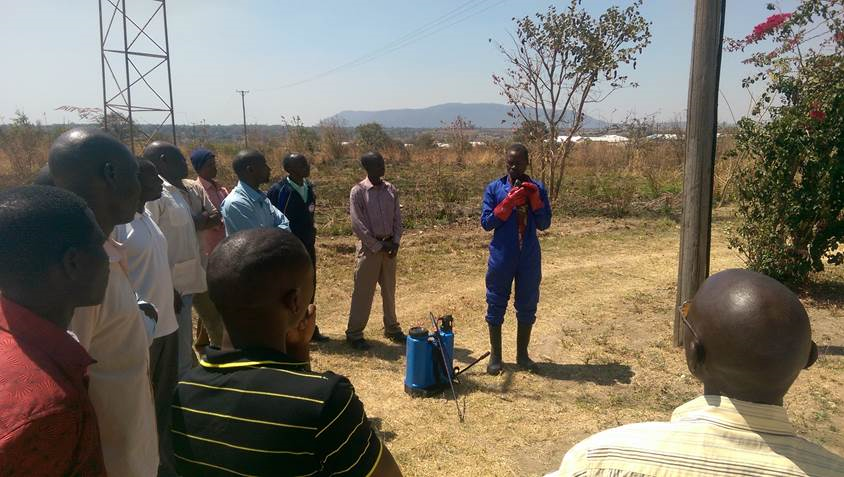Zambian farmers hold their certificates of completion following Dr. Joey Goeb's pesticide safety training course. Photo credit: Dr. Joey Goeb, Michigan State University

I had the opportunity to make a small effort towards that goal with a pesticide training program in Zambia. I found farmers to be a generally eager audience for pesticide information. But we quickly discovered that not all information is equally impactful. How the information is delivered and the information content can affect learning and behavioral outcomes. First and foremost, trust is everything to farmers and unfortunately the extension agents in Zambia were stretched too thin (as is the case in many countries) to allocate much time to pesticides. So, we allowed each village to select a “lead farmer” to represent them and ultimately train them on pesticide use. These lead-farmers received a detailed training on pesticide safety, and they were asked to train the other farmers in their village on the same content. We also wanted to reinforce the training messages and to expand the number of farmers we could reach with information. Our first thought was to use cellphone messages – which have been effective tools in some contexts – but there is low ownership and inconsistent coverage in our study area. Rather than force the use of an impractical technology, we pivoted and sent farmers pesticide safety materials through ‘bush notes’ or informal letter systems. The training program (farmer-to-farmer training and letters) was generally effective: farmers seemed to trust the information and we reached ~75% of the targeted farmers.
The second important factor of farmer learning and behavioral changes was the information content. The first-best option for information coverage is a full integrated pest management (IPM) program to communicate all the nuances of pest management and pesticide use. However, budget and time constraints often factor into training decisions and extension agents have the difficult task of being generally knowledgeable – and thus able to address the many questions directed at them – and purposeful and targeted in their main messages. The three main themes of our program were (i) safe handling and application of pesticides (e.g., use of personal protective equipment), (ii) pesticide toxicity and how to identify and interpret toxicity color labels on pesticide packaging, and (iii) target pests controlled for several common pesticides (i.e., what each product is labelled to control).
Some messages had larger effects than others. Specifically, farmers responded strongly to messages (ii) and (iii) but message (i) had almost no impact. The most striking outcome from our training was that farmers previously believed that all pesticides were equally poisonous, but after our training, they could identify low toxicity pesticides (WHO class U) and they chose those pesticides more often. This is an important result that will have positive effects on farmer health and reduce environmental costs. However, the information on personal protective equipment (PPE) use did not change farmer knowledge or behaviors. We found that farmers already knew about PPE and reinforcing that knowledge with our training did not have any meaningful effect.


